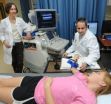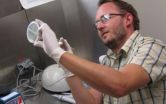(Press-News.org) Obesity is associated with insulin resistance and type 2 diabetes, both of which can be significantly improved by weight loss. Gastric bypass and adjustable gastric banding are two bariatric surgery techniques that are frequently used to effect weight loss in obese patients, but it is unclear if the two procedures produce different outcomes. In this issue of the Journal of Clinical Investigation, researchers led by Samuel Klein at the University of Washington School of Medicine in St. Louis compared the effects of 20% weight loss induced by either gastric bypass or adjustable gastric banding on metabolic response. They found that patients had different metabolic responses after eating, but both procedures equally improved insulin sensitivity and glucose tolerance. The researchers concluded that weight loss itself is primarily responsible for the therapeutic effects of gastric bypass and adjustable gastric banding in non-diabetic obese adults.
###
TITLE: Gastric bypass and banding equally improve insulin sensitivity and β-cell function
AUTHOR CONTACT:
Samuel Klein
Washington University School of Medicine, St Louis, MO, USA
Phone: 314-362-8708; E-mail: sklein@dom.wustl.edu
View this article at: http://www.jci.org/articles/view/64895?key=31c84cf8f52f834d9914
Bariatric surgical procedures have similar therapeutic benefits in obese adults
2012-11-26
ELSE PRESS RELEASES FROM THIS DATE:
JCI early table of contents for Nov. 26, 2012
2012-11-26
Bariatric surgery procedures have similar therapeutic benefits in obese adults
Obesity is associated with insulin resistance and type 2 diabetes, both of which can be significantly improved by weight loss. Gastric bypass and adjustable gastric banding are two bariatric surgery techniques that are frequently used to effect weight loss in obese patients, but it is unclear if the two procedures produce different outcomes. In this issue of the Journal of Clinical Investigation, researchers led by Samuel Klein at the University of Washington School of Medicine in St. Louis ...
Old habits die hard: Helping cancer patients stop smoking
2012-11-26
ANN ARBOR—It's a sad but familiar scene near the grounds of many medical campuses: hospital-gowned patients, some toting rolling IV poles, huddled in clumps under bus shelters or warming areas, smoking cigarettes.
Smoking causes 30 percent of all cancer deaths and 87 percent of all lung cancer deaths. Yet, roughly 50 percent to 83 percent of cancer patients keep smoking after a cancer diagnosis, through treatment and beyond, says Sonia Duffy, University of Michigan School of Nursing researcher. For patients who quit on their own, relapse rates (as in the general population) ...
Corporate wrongdoers should stick to the facts in post-crisis message
2012-11-26
When faced with scandal or wrongdoing, corporations should stick to the facts in their post-crisis messaging, according to a new study from researchers at Rice University, the University of Georgia and the University of Maryland – College Park.
The study, "Managing the message: The effects of firm actions and industry spillovers on media coverage following wrongdoing," examined quarterly media coverage of 45 U.S. public toy companies a 10-year period and over 5,500 press releases generated by the companies during that time.
Almost half of the companies surveyed conducted ...
Risk aversity visible in the brain
2012-11-26
Some people live their lives by the motto "no risk - no fun!" and avoid hardly any risks. Others are clearly more cautious and focus primarily on safety when investing and for other business activities. Scientists from the University of Bonn in cooperation with colleagues from the University of Zurich studied the attitudes towards risk in a group of 56 subjects. They found that in people who preferred safety, certain regions of the brain show a higher level of activation when they are confronted with quite unforeseeable situations. In addition, they do not distinguish as ...
Impaired blood vessel function found in cystic fibrosis patients
2012-11-26
AUGUSTA, Ga. – The first evidence of blood vessel dysfunction has been found in a small cohort of generally healthy young people with cystic fibrosis, researchers report.
"Even though the lung function in these kids is fine at this point, there is evidence of vascular dysfunction and exercise intolerance," said Dr. Ryan A. Harris, clinical exercise physiologist at the Medical College of Georgia and Institute of Public and Preventive Health at Georgia Health Sciences University. "We think this blood vessel dysfunction could be contributing to their exercise intolerance, ...
Microbial 'missing link' discovered after man impales hand on tree branch
2012-11-26
It all started with a crab apple tree.
Two years ago, a 71-year-old Indiana man impaled his hand on a branch after cutting down a dead tree. The wound caused an infection that led scientists to discover a new bacterium and solve a mystery about how bacteria came to live inside insects.
On Oct. 15, 2010, Thomas Fritz, a retired inventor, engineer and volunteer firefighter, cut down a dead, 10-foot-tall crab apple tree outside his home near Evansville, Ind.
As he dragged away the debris, he got tangled in it and fell. A small branch impaled his right hand in the fleshy ...
Water resources management and policy in a changing world: Where do we go from here?
2012-11-26
Visualize a dusty place where stream beds are sand and lakes are flats of dried mud. Are we on Mars? In fact, we're on arid parts of Earth, a planet where water covers some 70 percent of the surface.
How long will water be readily available to nourish life here?
Scientists funded by the National Science Foundation's (NSF) Dynamics of Coupled Natural and Human Systems (CNH) program are finding new answers.
NSF-supported CNH researchers will address water resources management and policy in a changing world at the fall meeting of the American Geophysical Union (AGU), ...
Burning more calories is easier when working out with someone you perceive as better
2012-11-26
MANHATTAN, Kan. -- The key to motivation in physical activity may be feeling inadequate. One Kansas State University researcher found that those who exercised with a teammate whom they perceived to be better increased their workout time and intensity by as much as 200 percent.
Brandon Irwin, assistant professor of kinesiology, was the principle investigator in a study that tested whether individuals engage in more intense physical activity when alone, with a virtual partner or competing against a teammate.
"People like to exercise with others and make it a social activity," ...
Funneling the sun's energy
2012-11-26
CAMBRIDGE, Mass. — The quest to harness a broader spectrum of sunlight's energy to produce electricity has taken a radically new turn, with the proposal of a "solar energy funnel" that takes advantage of materials under elastic strain.
"We're trying to use elastic strains to produce unprecedented properties," says Ju Li, an MIT professor and corresponding author of a paper describing the new solar-funnel concept that was published this week in the journal Nature Photonics.
In this case, the "funnel" is a metaphor: Electrons and their counterparts, holes — which are ...
Stopping flies before they mature
2012-11-26
An insect growth regulator is one of the latest technologies U.S. Department of Agriculture (USDA) scientists are adding to their arsenal to help fight house flies that spread bacteria to food.
Agricultural Research Service (ARS) scientists at the agency's Center for Medical, Agricultural, and Veterinary Entomology in Gainesville, Fla., are using an insect growth regulator called pyriproxyfen to kill house flies that spread bacteria that can cause diarrhea and other illnesses. When pyriproxyfen is applied to larval breeding sites such as manure, it mimics a hormone in ...


